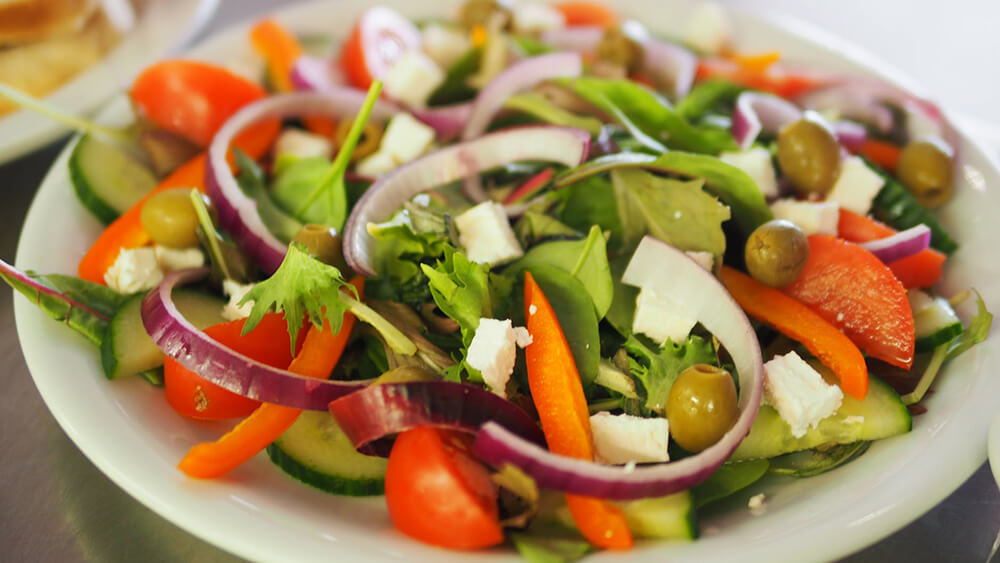
By healthy and appropriate food selections, a vegetarian can chose to eliminate all animal products from their diet, become a vegan, and still have a nutritionally adequate diet; but an unwise selection of foods can leave one short of certain nutrients and may induce deficiency symptoms and adverse health outcomes. Research has shown over and over again that following a plant-based diet will lower the risk of age-related problems such as overweight, high blood pressure, and heart disease, and in cases of heart disease, even reverse the damage.
Many vegans say that they are frequently misunderstood as fringe eaters with an unnatural passion for animal rights. And while many vegans certainly do feel passionately about animals, a vegan diet and lifestyle does go way beyond animal rights. In fact, following a healthy, balanced vegan diet brings about a host of amazing health benefits as well as prevention of some of the major diseases striking people in the United States and most other developed countries today.
The following nutritional benefits come from a vegan diet (full of foods such as fresh fruits and vegetables, whole grains, nuts, beans, and soy products).
Dairy products and meats contain a large amount of saturated fats. By reducing the amount of saturated fats from the diet, people will improve their health tremendously, especially when it comes to cardiovascular health.
Carbohydrates provide energy for the body. When people do not have enough carbohydrates, their body will burn muscle tissue.
A diet high in fiber (typical of vegan eating) leads to a healthier colon and bowel movements. High fiber diets help against colon cancer.
Aiding in the absorption of calcium, magnesium is an often overlooked vitamin in importance to a healthy diet. Nuts, seeds, and dark leafy greens are an excellent source of magnesium.
Potassium balances water and acidity in your body and stimulates the kidneys to eliminate toxins. Diets high in potassium have shown to reduce the risk of cardiovascular diseases and cancer.
This B vitamin is an important part of a healthy diet and helps with cell repair, generating red and white blood cells, and metabolizing amino acids.
For protection against cell damage, antioxidants are one of the best ways to help the body. Many researchers also believe that antioxidants help protect your body against forming some types of cancer.
Boosts the immune system, helps keep gums healthy and helps bruises heal faster. Vitamin C is also an antioxidant.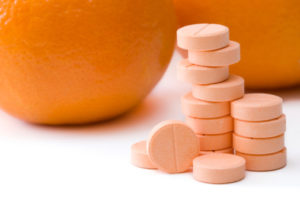
This vitamin benefits for the heart, skin, eyes, brain, and may even help prevent Alzheimer’s disease. A diet high in grains, nuts, and dark leafy greens is full of Vitamin E.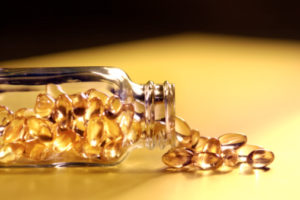
Plant-based foods provide phytochemicals, which help to prevent and heal the body from cancer, boost protective enzymes, and work with antioxidants in the body.
That protein is good for your body is no surprise. It may be a surprise to learn that most Americans eat too much protein and in forms such as red meat, which is not the healthiest source of protein. Beans, nuts, peas, lentils, and soy products are all great ways to get the right amount of protein in a vegan diet.
Eating a healthy vegan diet has shown to prevent a number of diseases.
Eating nuts and whole grains, while eliminating dairy products and meat, will improve cardiovascular health. A British study indicates that a vegan diet reduces the risk for heart disease and Type 2 diabetes. Vegan diets go far in preventing heart attack and stroke.
Eliminating any food that comes from an animal and you will eliminate all dietary cholesterol from your diet. Your heart will thank you for that.
A diet rich in whole grains is beneficial to your health in many ways, including lowering high blood pressure.
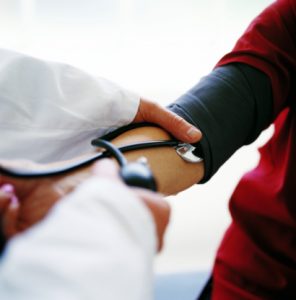
Not only is a vegan diet a weapon against Type 2 diabetes, it is also "easier to follow than the standard diet recommended by the American Diabetic Association." Read more about it here.
A major study showed that men in the early stages of prostate cancer who switched to a vegan diet either stopped the progress of the cancer or may have even reversed the illness.
Eating a diet consisting of whole grains, along with fresh fruits and vegetables, can greatly reduce the chances of colon cancer.
Countries where women eat very little meat and animal products have a much lower rate of breast cancer than women in countries that consume more animal products.
Diets with an abundance of fresh fruits and vegetables, especially leafy greens, carrots, pumpkin, and sweet potatoes, can help prevent the onset of age-related macular degeneration.
Much the same way macular degeneration is headed off by a vegan diet, cataracts are also thought to be prevented through the intake of the same fruits and vegetables. Produce high in antioxidants are also believed to help prevent cataracts.

Eliminating dairy consumption has long been connected with alleviating arthritis symptoms, but a new study indicates that a combination of gluten-free and vegan diet is very promising for improving the health of those suffering from rheumatoid arthritis.
Bone health depends on a balance of neither too much nor too little protein, adequate calcium intake, high potassium, and low sodium. With a healthy vegan diet, all four of these points set a perfect scenario for preventing osteoporosis.
The typical American diet not only consists of too much food, it also relies on too much of unnecessary food products or toxins. The following list explains how a vegan diet can eliminate these problems.
The average American eats two to three times as much protein as necessary for a healthy diet and much of that is from red meat. Getting protein from beans and grains is much healthier and reduces the risk for osteoporosis (see above).
The human body is not designed to digest cow milk and cow milk dairy products, yet the idea of milk being healthy is pushed through advertising. As many as 75% of people in the world may be lactose intolerant and many people suffer from undiagnosed milk allergies or sensitivities. By eliminating cow’s milk from your diet, you are improving your overall health.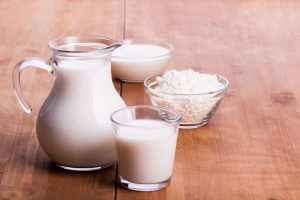
Many nutritionists believe that the number of eggs in the American diet is too high. While sometimes disputed, it has been shown that too many eaten eggs can raise cholesterol levels.

Most of the fish and shellfish consumed have mercury in it. While some fish have less than others, it is almost impossible not to be putting mercury in your body when you eat fish.
Most people have heard that Americans consume way too much sugar. Relying on other sweeteners that are not synthetic processed, or derived from animal products is a healthier way to eat. Many vegans do not eat processed sugar due to the fact that most of the cane sugar is refined through activated charcoal, most of which comes from animal bones.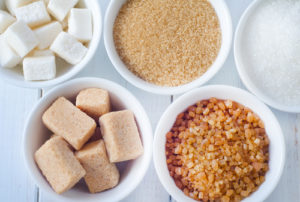
Eliminating dairy from the diet does remove a good source of calcium from the diet. Vegans can get their daily needs of calcium from dark green leafy vegetables (such as broccoli, Brussels sprouts, kale, and bok choy), calcium-fortified soy and rice beverages, and cereals, and calcium-fortified orange and apple juices. Tofu, oranges, tahini, figs, and sweet potatoes also provide useful amounts of calcium.
In addition to calcium, other components of a plant-based diet that are believed to protect the integrity of bone structure are potassium, magnesium, vitamin K, soy, and certain culinary herbs, such as thyme, sage, and rosemary.
This alkaline residue is especially important to the aging kidney which has a problem with handling excess acid. Vitamin K-rich leafy vegetables facilitate the formation of the essential bone protein osteocalcin. Women with a higher vitamin K intake (a green leafy vegetable at least once a day) had a 45 percent reduced risk of hip fractures compared to those women with a low intake (eating a leafy vegetable less than once a week).
The isoflavones in soy are also reported to significantly promote bone formation and inhibit bone loss. Two servings of soy per day provides the optimal effect.
During the winter months, vitamin D –rich foods are essential since very little, if any, vitamin D is synthesized by the body during the winter months for those living north of Denver and Washington DC.
Eliminating dairy from the diet has no impact on iron status since milk is a very poor source of iron. Furthermore, the iron in egg is not readily bioavailable. Hence, the vegan is not considered to be at any greater risk of iron deficiency compared with other vegetarians.
A major concern for those who subsist solely on plant foods has been vitamin B12. While meat, milk and eggs have ample vitamin B12 , plants contain none. Vitamin B12 deficiency can have serious consequences such as early dementia, lack of coordination, forgetfulness, nerve dysfunction, memory loss, disorientation, difficulty with concentration, and difficulty with one’s balance when walking.
It is important for vegans to daily consume foods fortified with vitamin B12 such as fortified soy and rice beverages, some cereals and meat analogs. Reading labels is important to ensure one has an adequate intake. In fact, all persons who are fifty years of age and above should consume foods that are fortified with vitamin B12 since they may have decreased stomach acid to digest the vitamin B12 in animal foods.
Long chain omega-3 fatty acids are important for cardiovascular health as well as brain and eye function. The fatty acids can be obtained from fish. The vegetarian can now obtain the omega-3 fatty acid DHA from microalgae supplements. In addition, the body can convert alpha-linolenic acid to the long chain fatty omega-3 fatty acid DHA, although this is a fairly inefficient process. Alpha-linolenic acid can be obtained from a variety of vegetable sources, including flax seed, canola oil, walnuts, tofu, soy beverages, and soy products.
Resources: livingnaturally.com, veganmeat.com, naturalnews.com
